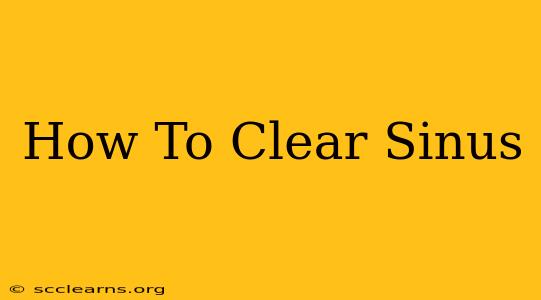A stuffy sinus is incredibly uncomfortable, making it hard to breathe, sleep, and even concentrate. Fortunately, there are several ways to clear your sinuses and find relief. This guide explores effective home remedies and when it's time to seek professional medical attention.
Understanding Sinus Congestion
Before diving into solutions, it's helpful to understand what causes sinus congestion. Sinus congestion occurs when the membranes lining your sinuses become inflamed and swollen, often due to:
- Viral infections (like the common cold): This is the most frequent culprit.
- Bacterial infections (sinusitis): These infections require antibiotics.
- Allergies: Pollen, dust mites, and pet dander are common triggers.
- Environmental irritants: Smoke, pollutants, and dry air can irritate the sinuses.
- Nasal polyps: These are benign growths in the nasal passages.
Home Remedies to Clear Your Sinuses
Several home remedies can provide relief from sinus congestion. Remember, these are supportive measures and may not work for everyone or every condition.
1. Saline Nasal Rinse (Neti Pot):
A saline nasal rinse is a highly effective way to flush out irritants and mucus from your nasal passages. You can purchase pre-made saline sprays or use a neti pot with distilled or sterile water mixed with salt. Proper technique is crucial to avoid infections, so follow the instructions carefully.
2. Steam Inhalation:
The heat and moisture from steam can help loosen mucus and relieve congestion. Simply inhale steam from a bowl of hot water (be careful not to burn yourself!) or take a hot shower. Adding essential oils like eucalyptus or peppermint can enhance the effect, but use them cautiously.
3. Hydration:
Drinking plenty of fluids, especially water, helps thin the mucus, making it easier to drain.
4. Elevate Your Head:
Sleeping with your head elevated on an extra pillow can help drain mucus and reduce congestion.
5. Warm Compress:
Applying a warm, damp compress to your forehead and sinuses can help soothe inflammation.
6. Over-the-Counter (OTC) Medications:
Several OTC medications can provide relief:
- Decongestants: These can help shrink swollen nasal passages but should be used cautiously and for a limited time to avoid rebound congestion.
- Pain relievers: Over-the-counter pain relievers like ibuprofen or acetaminophen can help reduce pain and fever associated with sinus infections.
- Nasal sprays: Saline sprays can help moisturize and rinse your nasal passages. Some contain decongestants but should be used sparingly.
When to See a Doctor
While home remedies can often alleviate sinus congestion, it's important to seek medical attention if your symptoms worsen or persist. See a doctor if you experience:
- Severe pain: Intense facial pain or headache.
- High fever: A fever above 101°F (38.3°C).
- Green or yellow mucus: This could indicate a bacterial infection.
- Symptoms lasting more than 10 days: Prolonged congestion might require medical intervention.
- Difficulty breathing: Any significant breathing problems warrant immediate medical attention.
Preventing Sinus Congestion
You can take steps to prevent sinus problems. These include:
- Avoid allergens and irritants: Identify and minimize exposure to substances that trigger your allergies.
- Maintain good hygiene: Wash your hands frequently to prevent infections.
- Stay hydrated: Drinking enough water keeps mucus thin and prevents dryness.
By understanding the causes of sinus congestion and employing the right strategies, you can effectively manage your symptoms and breathe easier. Remember that this information is for general knowledge and does not replace professional medical advice. Always consult a healthcare provider for diagnosis and treatment.

